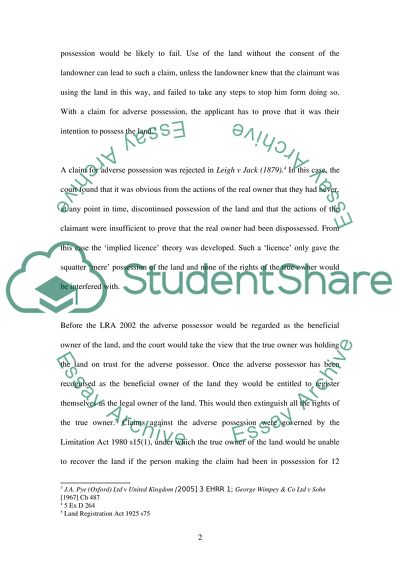Cite this document
(The Law of Trusts and Equitable Obligations Essay, n.d.)
The Law of Trusts and Equitable Obligations Essay. Retrieved from https://studentshare.org/law/1561991-the-law-relating-to-adverse-possession-has-been-fundamentally-changed-by-the-land-registration-act-2002-critically-evaluate-this-statement-with-reference-to-the-justifications-for-changes-to-this-area-of-the-law
The Law of Trusts and Equitable Obligations Essay. Retrieved from https://studentshare.org/law/1561991-the-law-relating-to-adverse-possession-has-been-fundamentally-changed-by-the-land-registration-act-2002-critically-evaluate-this-statement-with-reference-to-the-justifications-for-changes-to-this-area-of-the-law
(The Law of Trusts and Equitable Obligations Essay)
The Law of Trusts and Equitable Obligations Essay. https://studentshare.org/law/1561991-the-law-relating-to-adverse-possession-has-been-fundamentally-changed-by-the-land-registration-act-2002-critically-evaluate-this-statement-with-reference-to-the-justifications-for-changes-to-this-area-of-the-law.
The Law of Trusts and Equitable Obligations Essay. https://studentshare.org/law/1561991-the-law-relating-to-adverse-possession-has-been-fundamentally-changed-by-the-land-registration-act-2002-critically-evaluate-this-statement-with-reference-to-the-justifications-for-changes-to-this-area-of-the-law.
“The Law of Trusts and Equitable Obligations Essay”. https://studentshare.org/law/1561991-the-law-relating-to-adverse-possession-has-been-fundamentally-changed-by-the-land-registration-act-2002-critically-evaluate-this-statement-with-reference-to-the-justifications-for-changes-to-this-area-of-the-law.


